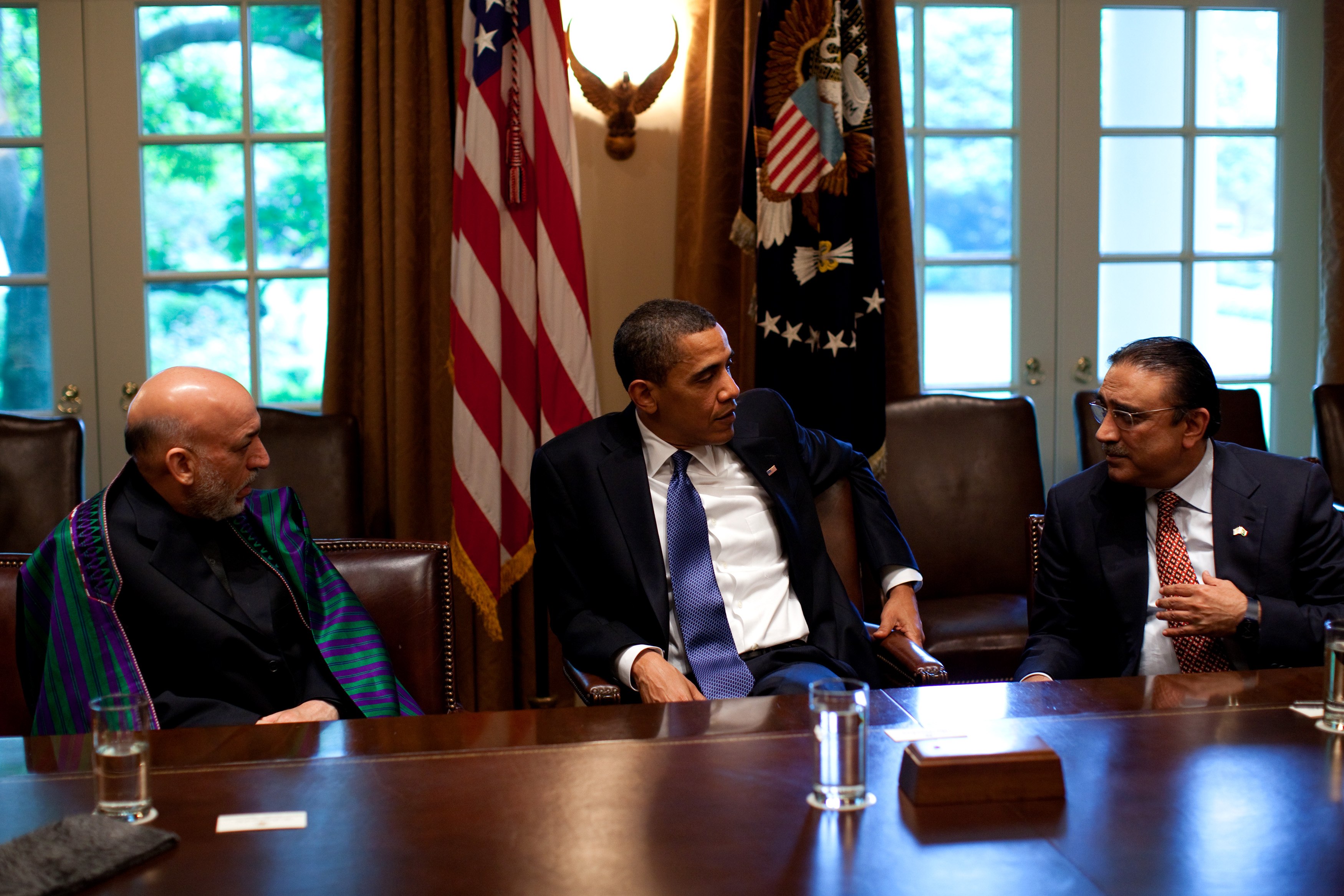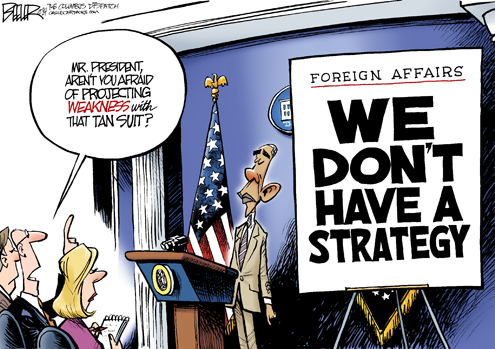
Unveiled in early February, President Barack Obama’s 2015 national defense strategy has garnered more criticisms for the already-criticized president. Advocating for “strategic patience,” the strategy presented a variation on the Obama administration’s theme of restraint and caution in international affairs. “America leads from a position of strength. But, this does not mean we can or should attempt to dictate the trajectory of all unfolding events around the world,” the 2015 strategic document said. “As powerful as we are and will remain, our resources and influence are not infinite. And in a complex world, many of the security problems we face do not lend themselves to quick and easy fixes.”
While Obama’s supporters may applaud his policy as fundamentally pragmatic, his detractors are numerous and vocal. His policy in the Middle East has been attacked as reactionary at best, perhaps even nonexistent. These arguments do tend to fall along party lines, but they are not entirely invalid. America is consistently unprepared for crises in the Middle East, and our response has been often too little, too late.
Ideally, American foreign policy should be agile, timely and forward thinking. Yet the events in Syria have painted American leadership as weak and paralyzed by uncertainty. In 2013 Obama backed down from a “red line” and proceeded with a wishy-washy mix of concern and inaction. With the Islamic State of Iraq and the Levant (ISIL) burgeoning into an issue that irrefutably demands action, many critics argue that America’s “caution” at the outset of the Syrian civil war, in addition to its hasty withdrawal from Iraq, allowed ISIL to grow into the menace it is today. When Obama announced that he “did not yet have a strategy against ISIL” in January, it opened the floodgates of Republican outrage.
https://www.youtube.com/watch?v=NatamqLN2WI
It’s clear the American public isn’t happy with Obama’s foreign policy. As of January 2015, more than half of Americans believe that the Obama administration’s policies toward hot spots in the Middle East have mostly failed. Foreign Policy magazine noted that denouncing Obama’s strategy has become “one of Washington’s favorite pastimes.” Politicians and commentators alike bemoan his reactionary foreign policy, criticizing the “ad-hoc” treatment of seemingly every international crisis, from Ukraine to ISIL. Everyone seems to be asking, “Isn’t there some analyst who should’ve seen that coming?” But despite all of the criticism, few viable alternatives have been presented.
Americans – policy wonks in particular – want a grand strategy. We want something that can be summarized into elegant simplicity. American leaders ascribed to a containment policy during the Cold War, and we abided by it faithfully. It succinctly prescribed action in nearly ever arena of foreign policy, and that action could be easily understood given America’s objectives. But the fall of the Berlin Wall in 1989 ushered in a new age of international politics, and leaders and scholars alike were divided as to what form America’s policy should take.
The post-Cold War period is undeniably more complex. 9/11 changed the global paradigm once more, and today, using a simple dichotomy to define our interests is woefully inadequate. Using generalizations like “Western Democracy vs. Radical Islam” to guide policy is naive. After 9/11, President Bush set about a crusade to bring democracy to the Middle East. The Bush Doctrine, as it was coined, was underpinned by the belief that spreading democracy was singularly critical to American national security. It made unilateral action entirely permissible. Our policy was defined by state building; our engagments were pitched as wars on ideas, not states.
Bush had a clear strategy. This strategy, however, led to acute war fatigue at home and censure abroad. Nor was it particularly effective. Iraq is worse off than when the U.S. first invaded in 2001, and it is hard to argue that America’s actions did not promote the descent into chaos. While Saddam Hussein’s regime was violently oppressive, there was some semblance of law and order in Iraq. Today, there is neither stability nor freedom, thanks to ISIL. Afghanistan’s progress is similarly ambiguous given our immense investment in the war there. While the Taliban is no longer in power, they still pose a significant threat to stability in Afghanistan. In fact, despite the official American withdrawal, American-led counterterrorism raids are on the rise again.
It was in the wake of these exhausting and protracted conflicts that Obama was elected. Americans decided they didn’t want to be the world’s policeman anymore. They wanted the wars to be over, and they didn’t want a messianic foreign policy that tried to bring the world into democracy’s idyllic domain. Pew Research found that 52 percent of Americans think we should “mind our own business” abroad, compared to just 30 percent in 2002. Obama’s foreign policy reflects this. He’s pursued a policy that focuses on diplomacy, not unilateral action. He’s sought a denouement to the decade-long nuclear standoff with Iran. In 2009, he spoke in Cairo with words of peace and commonality directed towards the entire Muslim world: “I’ve come here to Cairo to seek a new beginning between the United States and Muslims around the world, one based on mutual interest and mutual respect, and one based upon the truth that America and Islam are not exclusive and need not be in competition.”
Obama reopened relations with Cuba, and he has advocated for a more even-handed approach to the Israel-Palestinian conflict. In the same speech in Cairo mentioned above, he defended America’s relationship with Israel, but clearly emphasized the legitimacy of Palestine’s existence. “Israelis must acknowledge that just as Israel’s right to exist cannot be denied, neither can Palestine’s.”
In 2013 he spoke again on the topic in Jerusalem. He framed the Israeli-Palestinian conflict in pragmatic terms, but used language that gave unequivocal support for Palestinian sovereignty: “Given the demographics west of the Jordan River, the only way for Israel to endure and thrive as a Jewish and democratic state is through the realization of an independent and viable Palestine.”
On balance, President Obama’s foreign policy seems rooted in the belief that diplomacy is ideal – not in an ethical sense, but pragmatically. Americans learned the hard way that “boots on the ground” won’t always bring victory, and if the United States can support its interests without spending billions on wars, it should. I find it hard to argue with that. If the Middle East had not erupted into such turmoil, I doubt Obama’s policy would be under so much scrutiny. His driving political beliefs seem well suited towards growing peace once its already been sown. It is unlikely, however, that the Middle East has reached that point yet. Were the world stage less uncertain, his diplomatic policies might be heralded as innovative and courageous. Unfortunately, America’s interests in the Middle East still warrant strong action, including military operations. ISIL is a menace, and we cannot rely on diplomacy to quell such barbarism. While multilateralism is crucial, Obama has dragged his feet so long that that the problem is now far more daunting.
America doesn’t need a grand strategy in the Middle East because the world is far grayer than it ever was. Pitting “terrorism” versus “democracy” simply disguises the complexity of what causes unrest and instability in the Middle East. We do, however, need a stronger vision of our goals in the Middle East and the nature of the challenges we face. This is not an unreasonable goal. An article recently published in The Atlantic, What ISIS Really Wants, provides some fascinating insights into what drives ISIL. Not just insane fanatics, they follow a medieval, literalist interpretation of the Quran. Their actions, when viewed in this context, will be fairly predictable. Using intelligence based on in-depth cultural and ideological analysis, we can better understand our enemy and develop smarter, more realistic strategies.
In sum, we need strong intelligence to drive our foreign policy, not reluctance. America needs a leader who not only holds diplomacy and cooperation in high regard, as Obama has demonstrated, but who can act with conviction. Ultimately, America will be better served by seeking friends in the international community rather than enemies, and I believe Obama’s foreign policy reflects this belief.
However, in its aim to avoid belligerency and unilateral folly, America cannot succumb to paralytic inaction.
